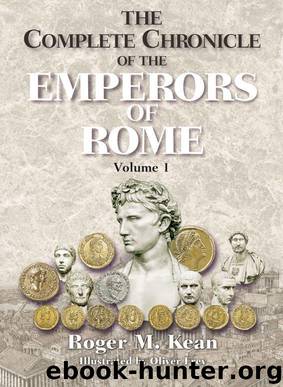The Complete Chronicle of the Emperors of Rome; Vol. 1 by Roger M. Kean

Author:Roger M. Kean [Roger M. Kean]
Language: eng
Format: epub
Hadrian’s Administration
The provinces benefited from Hadrian’s imperial perambulations, although in the first instance the cost of receiving the emperor and his “burdensome” retinue fell on the cities, colonies, and municipia no matter how modestly Hadrian comported himself. In almost all cases, however, the provincials received far more than they had to give. Hadrian undertook public works wherever he went; new roads and bridges, aqueducts, modern harbors, lavish temples, public baths, and games. Ephesus and Trapezus received new harbor installations, he built aqueducts at Athens and Corinth, and new roads were laid and bridges raised as far apart as Hispania and easternmost Moesia Inferior. In addition Hadrian was Rome’s greatest city-builder. New cities sprang up all over the empire, many in the Danubian provinces. From Forum Hadriani in the extreme north (Voorburg-Arentsburg, Holland) to Colonia Julia Hadriana Avenio (Avignon) in Gaul, Hadrian’s civic engineers were at work throughout his reign. The most famous is Hadrianopolis in Thracia, known better today as Adrianople (although it was renamed Edirne in the fifteenth century by the Ottoman Turks). Not every civil scheme met with approval, however: the rebuilding of Jerusalem was to be the cause of a dangerous rebellion.
As a part of his consolidation of the frontiers Hadrian extended municipal rights to many of the settlements that had sprung up around the great frontier legionary camps. None of his predecessors had allowed any such towns charters as municipia. In contrast he contemplated evacuating Dacia to conserve military resources, but was persuaded against a move that would have left so many recent settlers at the mercy of the local tribes. While the provinces gained much from Hadrian’s construction activity and travels, adlection into the senate continued to deprive the provincial cities of wealthy and experienced administrators. As a consequence Hadrian was obliged to follow Trajan’s precedent of sending in his own curatores to administer financially embarrassed localities.
Hadrian’s attention to detail is also to be found in his famous codification of Roman law, also known as the Codification of the Praetor’s Edict. In one respect, this can be seen as bringing within the principate’s autocratic control an element of Roman life that had been allowed to escape it. On the other hand, it benefited citizens by providing a standard interpretation of the complex judicial processes that had grown up since the mid-Republican era. At that point in time the urban praetors began to issue a statement of the program of legal procedure and interpretation that each proposed to follow during his term of office. In theory this fixed how the laws would be interpreted from that point on. However, his successor in office was not bound by this edictum perpetuum, in fact it was only when the Lex Cornelia of 67 BC was passed that a praetor was even obliged to abide by his own edict, let alone that of his predecessors.
Nevertheless, situations would arise in which, to suit the circumstances of the case being heard, the praetor needed to add to the body of law
Download
This site does not store any files on its server. We only index and link to content provided by other sites. Please contact the content providers to delete copyright contents if any and email us, we'll remove relevant links or contents immediately.
| Africa | Americas |
| Arctic & Antarctica | Asia |
| Australia & Oceania | Europe |
| Middle East | Russia |
| United States | World |
| Ancient Civilizations | Military |
| Historical Study & Educational Resources |
The Daily Stoic by Holiday Ryan & Hanselman Stephen(3131)
The Fate of Rome: Climate, Disease, and the End of an Empire (The Princeton History of the Ancient World) by Kyle Harper(2896)
People of the Earth: An Introduction to World Prehistory by Dr. Brian Fagan & Nadia Durrani(2634)
Ancient Worlds by Michael Scott(2517)
Babylon's Ark by Lawrence Anthony(2448)
Foreign Devils on the Silk Road: The Search for the Lost Treasures of Central Asia by Peter Hopkirk(2393)
The Daily Stoic by Ryan Holiday & Stephen Hanselman(2375)
India's Ancient Past by R.S. Sharma(2318)
MOSES THE EGYPTIAN by Jan Assmann(2290)
The Complete Dead Sea Scrolls in English (7th Edition) (Penguin Classics) by Geza Vermes(2157)
Lost Technologies of Ancient Egypt by Christopher Dunn(2136)
The Earth Chronicles Handbook by Zecharia Sitchin(2114)
24 Hours in Ancient Rome by Philip Matyszak(1988)
Alexander the Great by Philip Freeman(1975)
Aztec by Gary Jennings(1892)
The Nine Waves of Creation by Carl Johan Calleman(1800)
Curse Tablets and Binding Spells from the Ancient World by Gager John G.;(1782)
Before Atlantis by Frank Joseph(1750)
Earthmare: The Lost Book of Wars by Cergat(1728)
